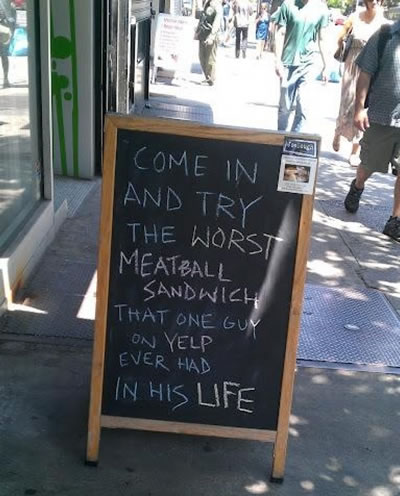
(Photo by Christine Kirk)
Imagine…You just graduated from culinary school, poured your lifetime of savings into a new restaurant in your home town, and people start regularly coming in to enjoy a fantastic meal. But one day someone asks if you’ve seen a new review on Yelp that gives you a strongly negative review. How do you handle the negative publicity?
You’re probably curious to find out more about the negative experience someone had in hopes of solving a small problem before it turns bigger. Maybe your pride has been hurt. You might want to find out if “that guy” has a personal grudge (or is a competitor of yours’). You might even worry that others will read the review, and start crossing off your restaurant before they even give it a try for themselves.
If your offering is indeed “awful”, no amount of marketing will help change the perception (see Marketing: Lipstick On a Pig?). Fix the awful problem first, then attempt to change the perception.
But if you’re confident in your value and creative, you’d take the negative and turn it into a positive marketing opportunity. By highlighting your offering as “the worst” that one guy had cast this reviewer in the minority and tells your whole story simply (“It’s not us. It’s them.”).
If you don’t do something well, then state that upfront in your marketing. While conventional wisdom is to not showcase a weakness, by stating yours makes the rest of your marketing more believable. If you’re honest enough to say “don’t come to us for this“, then when you say, “We’re the best in that” makes your claim much stronger.
So if you’re lucky enough to be in business long enough to get negative reviews, focus on their value. Nothing spreads like bad news. Therefore, piggyback your positive message onto their negativity to achieve a memorable message for your own benefit.